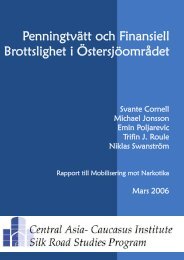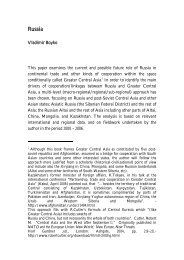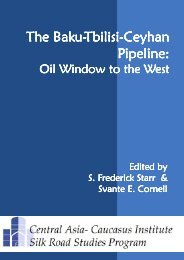Eurasianism and the Concept of Central Caucaso-Asia
Eurasianism and the Concept of Central Caucaso-Asia
Eurasianism and the Concept of Central Caucaso-Asia
You also want an ePaper? Increase the reach of your titles
YUMPU automatically turns print PDFs into web optimized ePapers that Google loves.
Rethinking <strong>Central</strong> Eurasia 83<br />
The above suggests that America is not seeking integration with any <strong>of</strong> <strong>the</strong><br />
regional countries. In <strong>the</strong>se terms its policy completely corresponds to <strong>the</strong><br />
local countries’ national interests: streng<strong>the</strong>ning <strong>and</strong> developing state<br />
sovereignty, deepening democratization, <strong>and</strong> enhancing <strong>the</strong> market economy.<br />
The term “<strong>Central</strong> <strong>Caucaso</strong>-<strong>Asia</strong>” does not merely specify <strong>the</strong> region’s<br />
geographic identity. It is a conceptual idea that regards <strong>the</strong> interests <strong>of</strong><br />
streng<strong>the</strong>ning <strong>the</strong> local countries’ state sovereignty. In principle, it<br />
contradicts <strong>the</strong> spirit <strong>and</strong> idea <strong>of</strong> <strong>Eurasianism</strong>.<br />
Again, even though it is accepted that <strong>the</strong> key strategic interests <strong>of</strong> <strong>the</strong><br />
<strong>Central</strong> <strong>Asia</strong>n countries “can be described as independence, democracy, <strong>and</strong><br />
integration,” 346 possible reintegration into Eurasia-Russia (to which <strong>Central</strong><br />
<strong>Asia</strong> belonged as part <strong>of</strong> <strong>the</strong> Soviet Union) is not excluded. 347 Taking into<br />
account <strong>the</strong> Eurasianists’ assertion that Moscow claims domination over this<br />
Eurasia, <strong>the</strong> above arguments do not exclude (even in <strong>the</strong> relatively distant<br />
future) <strong>the</strong> possibility that <strong>the</strong> <strong>Central</strong> <strong>Asia</strong>n countries will join Eurasia-<br />
Russia. It is equally interesting that some experts from <strong>Central</strong> <strong>Asia</strong>n states<br />
are not alien to nostalgic reminiscences about <strong>the</strong> Soviet Union. They openly<br />
regret its disintegration. 348 The pro-Western vector, on <strong>the</strong> o<strong>the</strong>r h<strong>and</strong>, is<br />
much better suited to <strong>the</strong> interests <strong>of</strong> stronger sovereignty, deeper<br />
democratization, <strong>and</strong> promotion <strong>of</strong> <strong>the</strong> principles <strong>of</strong> a market economy, since<br />
<strong>the</strong>y are commonly recognized Western principles.<br />
346 Ibid., p. 31.<br />
347 Ibid., p. 18.<br />
348 For example, Aziz Niyazi, “The South <strong>of</strong> <strong>the</strong> CIS: Fundamental Problems <strong>of</strong><br />
Development,” <strong>Central</strong> <strong>Asia</strong> <strong>and</strong> <strong>the</strong> Caucasus, No. 6 (24) (2003), p. 150; Tolipov, “Russia<br />
in <strong>Central</strong> <strong>Asia</strong>,” pp. 19-20.






